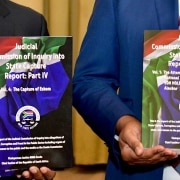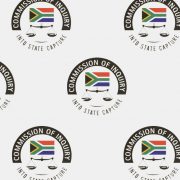|
Getting your Trinity Audio player ready...
|
By David Lewis
Despite the perennial hype surrounding the budget, as long as we have a sane finance minister the “hard” content is inevitably pretty predictable. A good budget is generally a paragon of moderation. Unless it succumbs to special-interest pressure, it won’t slash and burn, and it won’t throw money from a helicopter. It will lean in one direction or another.
And so with last week’s budget. On balance, it probably inclined towards greater austerity, but with enough to meet those wide-ranging interests that, justifiably, require fiscal support. No surprises there. A job well done. And so, with a familiar yawn, I started reading the speech, only to discover that the 2016 budget speech was the most inspiring government policy statement in many a year. It charted a way forward that relies not on subtle tweaks of fiscal policy, but on the building of social capital that rests on citizen activism and social cohesion. This is the only sustainable way forward.
And so, actually, it’s the soft stuff, stupid. Consider the following: “But I know you will join me in acknowledging that the real champions of our development are the activists and entrepreneurs, officials and facilitators, who get on with the job, day by day, of managing programmes and running businesses, serving communities and meeting needs.” And this: “The Gauteng province’s Ntirhisano outreach programme similarly emphasises that communities can be co-partners with government in accelerating service delivery. We can strengthen these efforts as government, business, religious and community organisations, by working together.”
Sure, every budget speech contains some exhortation to “work together”. But right now, its contrast with the unbridled hostility of most of the current political leadership towards civil society leaps out.
As but one example, contrast Finance Minister Pravin Gordhan’s words with those of his Cabinet colleague, Blade Nzimande, whose failure to govern co-operatively has given rise to the most serious consequences imaginable, and who recently described civil society as “a disease”.
Gordhan gave content to his words. In arguably the most important, although largely ignored, paragraph in the entire speech, he promised: “This year brings our fourth fully democratic local government elections. In recognition of this, the National Treasury will launch a data portal to provide all stakeholders with comparable, verified information on municipal financial and nonfinancial performance. I hope this will further stimulate citizen involvement in local governance.”
Gordhan was saying that to know whether public services are being delivered, we’ll ask the intended recipients. And to get a constructive answer, we’ll inform them. We’ll tell the public if, in the face of needs deemed more pressing, we have not been willing to allocate the resources necessary to meet a particular demand. And when resources have been allocated to a particular local government, we’ll tell the affected community so that it can monitor the delivery of the services in question. At the very least, this will enable communities to know where to direct their grievances.
Imagine the power of a notice outside the municipal offices informing the community how much had been allocated to provide housing, how many houses would be built and to what specification, and what the completion date would be, with a telephone number to which complaints could be addressed. Imagine a board outside a school that revealed the same information about resources allocated for the building of new classrooms. Were this to be seriously pursued, it would be a simple, elegant solution to many of the problems dogging the expenditure side of our budget.
Nor was this the only “soft” reform proposed. References to the wreckage that are our state-owned enterprises support the view that relatively inexpensive reforms of grossly deficient governance structures and practices will go further than throwing vast amounts of money their way, at least that the latter cannot be done without simultaneously tackling the former.
Gordhan confirmed his support for reforming public procurement, largely by making the procurement processes more transparent. This is the main thrust of the work of the chief procurement officer in the Treasury, and represents our best shot at reducing corruption in public procurement. Again, if public-procurement processes and decisions are to be trusted, then harness the interests of the public and of competing bidders in ensuring competitive tendering.
In a post-budget radio interview, Gordhan was asked how the public broadcaster could participate in combating corruption. His answer: encourage the public to report corruption and make your platforms available for them to do so. And he called on the public to pressure the law-enforcement authorities to impose consequences on those who are corrupt. Therein lies the rub. This year’s budget speech may be a key moment in our efforts to combat corruption. Or, it may be another opportunity tragically lost. The Treasury’s leverage can accomplish much, but it cannot deal with corruption and maladministration on its own. For that, the entire machinery of government must come to the party, whether to introduce reforms or to punish those who refuse to play by the rules.
The cold fact is that if all that the public was hearing and seeing came from the Treasury, there would be good reason for believing that government is serious about tackling corruption, good reason for believing that, to tackle corruption, government is willing to hold itself accountable to the public. Declining public trust in government, in the key institutions of democracy and in the private sector, is the greatest cost of corruption. Arresting it is a precondition for achieving the social cohesion and stability that inclusive economic growth requires.
But when corrupt deals fill the newspapers and crooked traffic cops, housing officials and school principals are in front of the public’s collective mind, the good work of the Treasury and a handful of other institutions is overshadowed by the venality of those who, with impunity, loot public resources and abuse public power. Those members of the public who have lost faith in the government and institutions, not to mention in a cowed and complicit business establishment, will either get their own snouts in the trough, or they will take to the streets. Or they’ll simply disengage from civic life, thus further relaxing the pressure for accountable government.
The finance minister has turned to his most reliable allies: those who require effective and clean government for the provision of their most basic goods and services.
“We need,” Gordhan concluded, “to move forward to mobilise the resources and capacity of all our people, large and small enterprises, civil society organisations and public-private partnerships.”
The real tragedy would be if “we, the people’ were to decline this invitation.
• First published in Business Day







